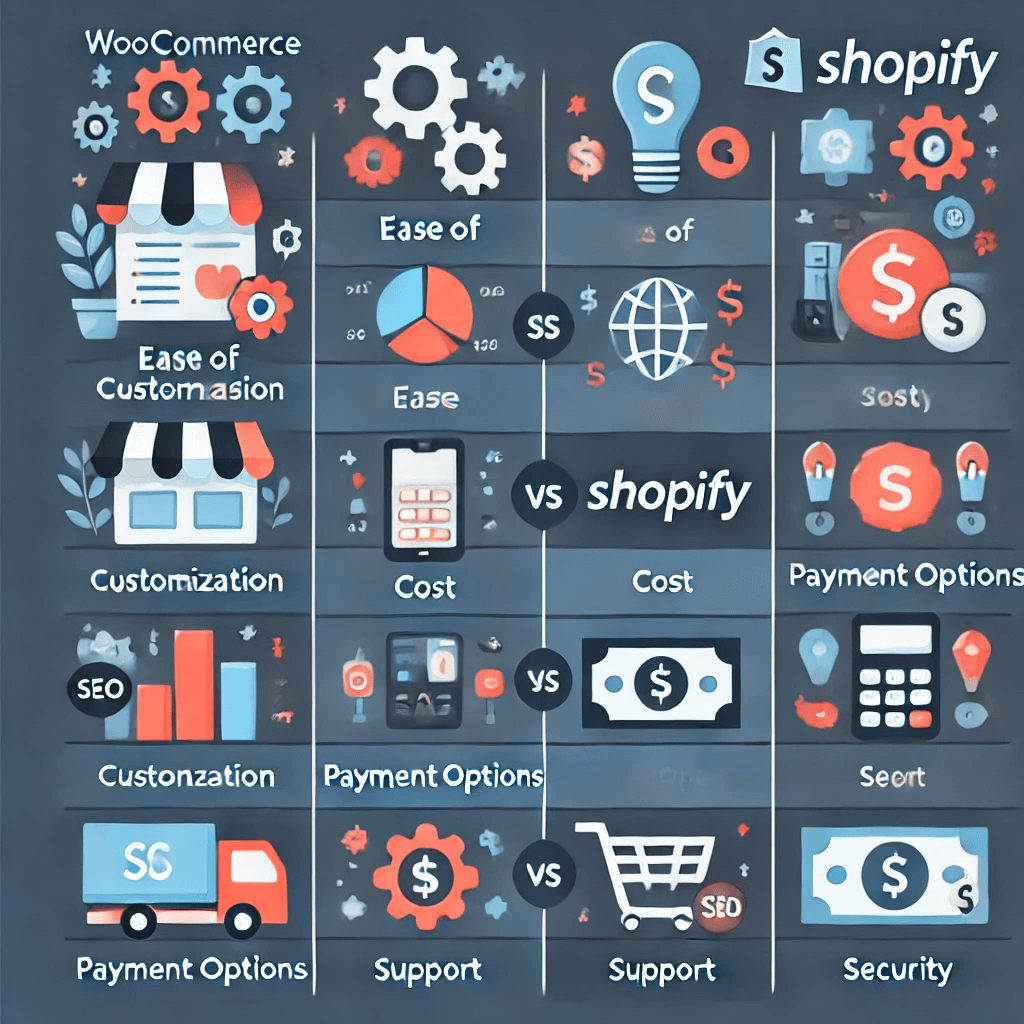In today’s digital era, establishing an online store is a significant step for businesses aiming to reach a broader audience. Two popular platforms for this purpose are WooCommerce and Shopify. Each has its own set of features, benefits, and limitations. This article provides a detailed comparison to help you decide which platform suits your business needs WooCommerce vs Shopify.
Ease of Use
WooCommerce: This platform is a WordPress plugin, making it a convenient choice for those familiar with WordPress. It offers flexibility and control, but it requires some technical know-how to set up and manage. The learning curve can be steep for beginners, especially those not accustomed to WordPress.
Shopify: Shopify is a fully hosted solution, which means it handles all technical aspects such as hosting, security, and updates. This platform is user-friendly and designed for ease of use, even for those with no technical background. Setting up a store is straightforward with its drag-and-drop interface.
Customization and Flexibility
WooCommerce: Being an open-source platform, WooCommerce offers extensive customization options. You can modify every aspect of your store, provided you have the necessary coding skills or access to a developer. The platform supports a wide range of plugins and themes, allowing for a highly personalized store.
Shopify: Shopify also provides customization options, but within certain limits. While you can tweak themes and use apps to extend functionality, the extent of customization is less compared to WooCommerce. However, for most users, Shopify’s built-in features and available apps are sufficient for creating a professional online store.
Cost
WooCommerce: WooCommerce itself is free, but there are costs associated with hosting, domain registration, and additional plugins or themes. These costs can add up, especially if you opt for premium services or require extensive customizations.
Shopify: Shopify operates on a subscription model, with plans ranging from basic to advanced. While this means a predictable monthly cost, additional fees can apply for certain apps, themes, and transaction fees if you don’t use Shopify Payments. Overall, Shopify might be more expensive than WooCommerce in the long run, depending on your specific needs and the plan you choose.
Payment Options
WooCommerce: This platform supports a wide range of payment gateways, including PayPal, Stripe, and various regional options. It also allows you to add additional gateways through plugins, providing flexibility in how you accept payments.
Shopify: Shopify also supports numerous payment gateways, with Shopify Payments as the default option. Using Shopify Payments eliminates transaction fees, which can be an advantage. However, using external gateways can incur additional costs.
Scalability
WooCommerce: WooCommerce is highly scalable, but the responsibility for managing server resources, security, and performance lies with you. As your store grows, you may need to invest in better hosting and more robust infrastructure to maintain performance.
Shopify: Shopify is designed to scale with your business. It handles server management and ensures that your store can handle increased traffic and transactions without compromising performance. This makes it a suitable choice for businesses planning for rapid growth.
Support
WooCommerce: Support for WooCommerce is community-driven. There are numerous forums, tutorials, and documentation available, but you might need to rely on third-party developers for more complex issues. This can sometimes lead to higher support costs.
Shopify: Shopify offers 24/7 customer support through various channels, including live chat, email, and phone. This level of support can be invaluable, especially for those who prefer immediate assistance.
SEO Capabilities
WooCommerce: WooCommerce inherits WordPress’s strong SEO capabilities. You can use various SEO plugins to optimize your store, giving you full control over your site’s SEO settings. This makes WooCommerce a powerful option for those prioritizing search engine visibility.
Shopify: Shopify also offers robust SEO features, but with some limitations compared to WooCommerce. While you can still optimize your site effectively, some advanced SEO adjustments may not be as easily accessible.
Security
WooCommerce: Security is a significant consideration with WooCommerce. Since it is a self-hosted solution, you are responsible for securing your store. This includes managing SSL certificates, implementing security plugins, and staying on top of updates.
Shopify: Shopify takes care of security for you. It includes SSL certificates in all plans and ensures that your store complies with PCI standards. This takes the burden of security management off your shoulders.
Conclusion
Both WooCommerce and Shopify are powerful platforms for building an online store. The choice between the two largely depends on your specific needs and preferences. WooCommerce offers greater flexibility and control, making it suitable for those who are comfortable with technical aspects and seek extensive customization. On the other hand, Shopify’s ease of use, scalability, and comprehensive support make it an excellent choice for those looking for a hassle-free, fully managed solution. Carefully consider your business requirements, budget, and long-term goals to make the best decision for your online store.









